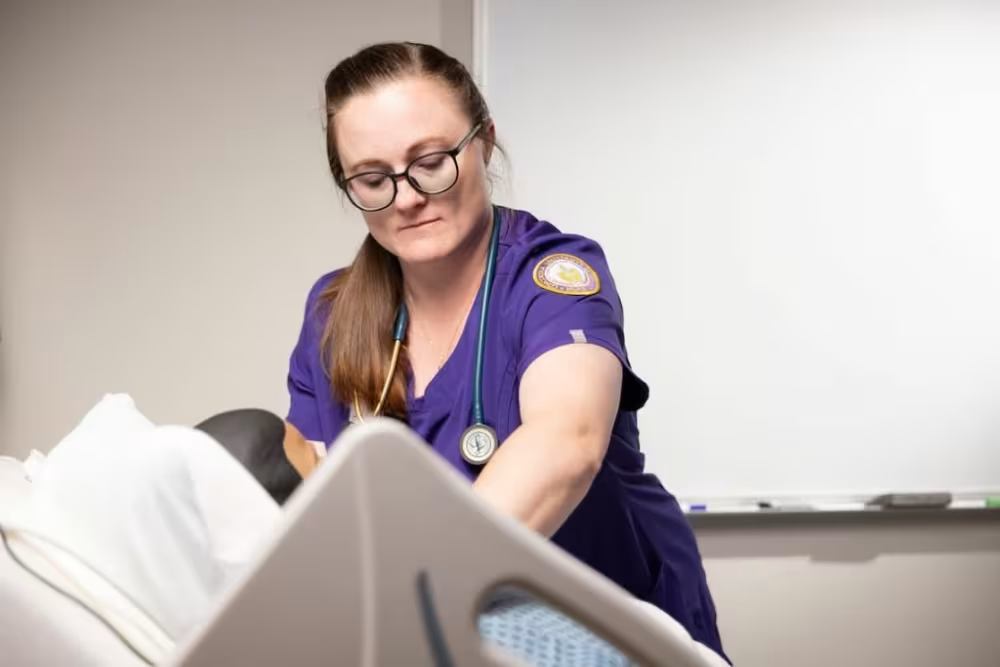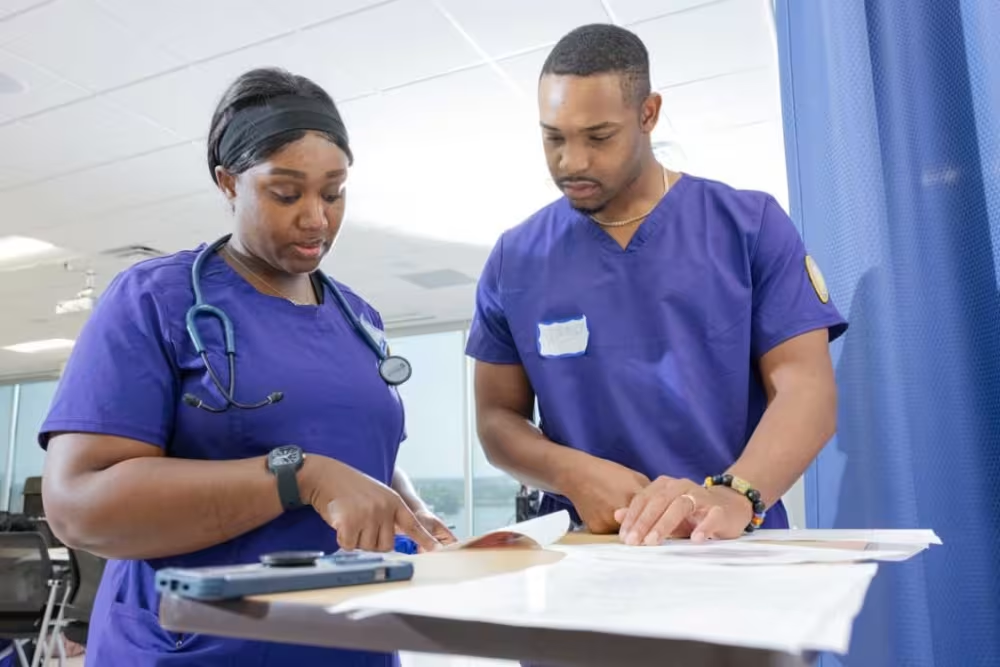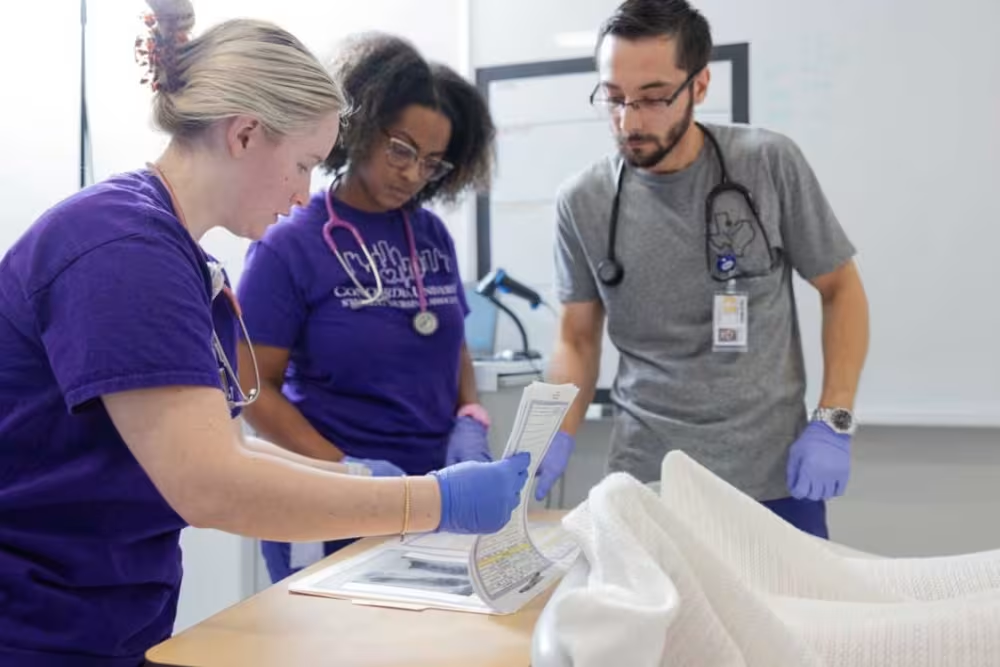What Is the Fastest Way to Become a Nurse?
Each blog post is dated and contains accurate information as of that date. Certain information may have changed since the blog post publication date. If you would like to confirm the current accuracy of blog information, please visit our ABSN overview page or contact admissions at (866) 891-1371.
The fastest way to become a nurse depends on your career goals. A traditional BSN track for a registered nurse is four years. An Accelerated BSN track, however, is the fastest way to become a nurse, at usually 16 months after prerequisites.

There is no universal pathway toward a nursing career. Because of that, timelines for nursing education can vary. The fastest way to become a nurse depends on the type of nurse you’d like to become, your current level of education, and how far you’d like to take your nursing career. For example, you might decide to become a registered nurse (RN) instead of a licensed practical nurse (LPN).
If you do decide that becoming an RN is the right move for your career, the quickest way to become a nurse could be an accelerated program like Concordia University Texas’s Accelerated Bachelor of Science in Nursing (ABSN) track. Allowing you to graduate in as few as 16 months, it’s among the fastest ways to become an RN, with locations in Austin and Dallas-Fort Worth, Texas.
Before taking a closer look at how to become an RN fast, you should compare the different levels of nursing and what their roles are. Then, dive into the career requirements and potential timelines.
LPN vs. RN vs. APRN: Which Career Path Is Best for You?
There are significant differences between an LPN, RN, and advanced practice registered nurse (APRN). Take a closer look at these differences to discover which career path appeals most to you.
What Is an LPN and What Does an LPN Do?
A licensed practical nurse, also sometimes called a licensed vocational nurse (LVN), is a nursing professional who provides basic nursing care in hospitals, clinics, private homes, and assisted living facilities. LPNs work under the supervision of an RN.
LPNs have fewer responsibilities than RNs, but their daily tasks may include:
- Changing bandages
- Documenting patient care
- Reporting patient concerns to RNs and other providers
- Helping patients with activities of daily living (ADLs), including bathing, dressing, and eating
- Monitoring vital signs
In some states, LPNs are able to administer medications and start intravenous (IV) lines.
What Is an RN and What Does an RN Do?
A registered nurse has more education and training than an LPN, which means they practice with greater autonomy. RNs are able to make many types of nursing care decisions. They can also work across a range of settings and in various nursing specialties, such as pediatrics or dermatology.

What is it like for students in our nursing school ABSN track?
Some of the responsibilities of an RN include:
- Medical equipment set-up and operation
- Medication administration
- Nursing care plan development
- Patient monitoring and charting
- Patient assessments
- Patient education
- Wound care
What Is an APRN and What Does an APRN Do?
An advanced practice registered nurse is at the highest level of nursing. Compared to RNs, APRNs have more education and training and a greater degree of autonomy. They serve as leaders and mentors.
The responsibilities of an APRN depend on their specialty area. Prominent APRN roles include:
- Certified nurse midwife (CNM): Provides reproductive healthcare at different life stages, from family planning to labor and delivery
- Certified registered nurse anesthetist (CRNA): Provides anesthetics and other pain control medicines to patients undergoing procedures
- Clinical nurse specialist (CNS): Handles complex patient cases and works to effect positive change on the healthcare system
- Nurse practitioner (NP): Treats patients across the lifespan, depending on subspecialty, and may prescribe medication in some states
How to Become an LPN
One of the quickest ways to become a nurse is to become an LPN, although the scope of responsibility and practice authority is considerably limited compared to RNs and APRNs.

Requirements
LPNs must fulfill the requirements established by their state, which will include completion of a state-approved LPN education track. This academic track results in a diploma or certificate, not a nursing degree. Aspiring LPNs must then pass the NCLEX-PN exam to gain licensure.
LPNs may also be required to have cardiopulmonary resuscitation (CPR) and/or basic life support (BLS) certification. They may also earn optional certifications in specialty areas, like gerontology.
Length of Time
A diploma or certificate training course generally takes one year to complete. It may then take several months to take the NCLEX-PN and obtain licensure, assuming the candidate passes the test on the first try.
How to Become an RN Fast
If a greater scope of responsibility and more autonomy appeal to you, consider taking a closer look at the fastest way to become an RN.
Requirements
In contrast to an LPN, an RN needs a nursing degree. It’s possible to meet the requirements to become an RN with either an Associate Degree in Nursing (ADN) or a Bachelor of Science in Nursing (BSN). Keep in mind, however, that only a BSN will allow you to apply to graduate-level nursing degree programs, which is necessary to become an APRN. In addition, BSN-prepared nurses are more capable of contributing to better patient outcomes, which is why employers generally prefer to hire them.
In addition to a nursing degree, an aspiring RN needs to obtain licensure by passing the NCLEX-RN®.

See why clinical experience is important in nursing education.
Length of Time
The length of time varies depending on the path you take. Timelines also vary by school, but the typical timelines are as follows:
- ADN: 24 months
- Traditional BSN: Four years
- ABSN track: As few as 16 months, upon completion of prerequisites
Enrolling in an ABSN track is often the fastest way to become a nurse, and it provides the same nursing education as a traditional BSN track.
Benefits of Becoming an RN
There are plenty of benefits to pursuing an RN career instead of an LPN career. Compared to LPNs, RNs:
- Have higher salary potential and a stronger job growth rate
- Can choose from a wide variety of nursing specialties and settings
- Have the potential to pursue career advancement as an APRN, nurse educator, nurse administrator, or other nursing professional
- Have greater autonomy and a broader scope of practice
- Can make a bigger impact on patient care
How to Become an APRN
If you aspire to reach the highest levels of nursing, you should know the journey will take longer, though it may be worth it for you.
Requirements
First, aspiring APRNs need to fulfill all the requirements of a BSN-prepared nurse. Then, they need to follow these steps:
- Gain clinical experience in their nursing specialty
- Obtain a Master of Science in Nursing (MSN) in their specialty area
- Obtain a doctorate in their specialty area, such as a Doctor of Nursing Practice (DNP)
- Obtain board certification and state-issued APRN licensure
Some APRN specialties require a doctorate degree, while others currently do not. Some doctorate degrees accept candidates with only a BSN, while others require an MSN.

Learn more about the process for becoming an advanced practice nurse.
Length of Time
The timeline can vary depending on the specific requirements of the APRN specialty and the chosen nursing schools. In general, the timeline after obtaining a BSN and an RN license may look like this:
- 1-3 years: Gain clinical experience
- 2-4 years: Obtain an MSN
- 3-5 years: Obtain a doctorate
- Variable: Pass the board certification exam and obtain APRN licensure
Benefits of Becoming an APRN
Compared to being an RN, the benefits of becoming an APRN can include:
- Higher salary potential and faster job growth rate
- Serving as nurse leaders and mentors
- Working with more autonomy
- Broader scope of practice
The Quickest Way to Become a Nurse at Concordia University Texas
Concordia University Texas offers Christ-centered nursing education in Austin and Dallas-Fort Worth to help you achieve your career goals. No matter how far you’d like to take your nursing career or which nursing specialty is right for you, you can build a strong foundation for your future with our rigorous curriculum. We offer both an ABSN track and a traditional BSN track, so you can choose the nursing school option that works best for you.
Contact an admissions counselor today to discuss eligibility and next steps.
